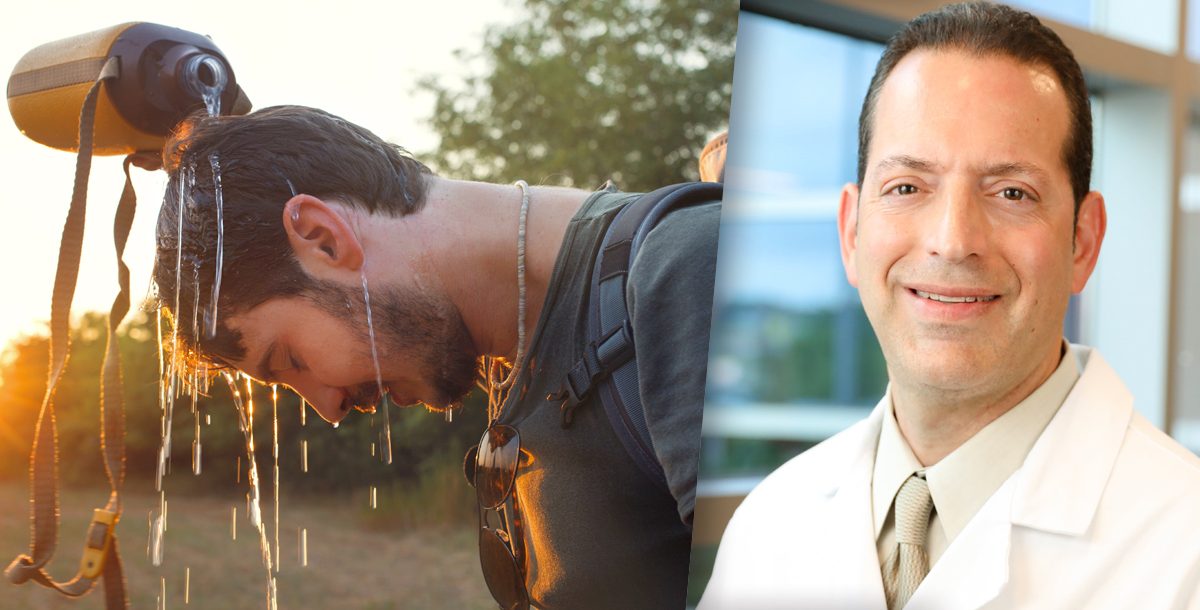We are well into summer and things are getting hot! We at Mercy Heath want to make sure you are staying safe and healthy when outside.
Prevention and planning are the keys to avoiding heat-related illness.
These steps include:
- Drinking water
- Avoiding direct sun exposure between 10 a.m. to 4 p.m. when possible
- Wearing loose-fitting, lightweight and light-colored clothing
- Wearing sunscreen
- Checking in on family, friends and neighbors who may be at risk
- If someone doesn’t have air conditioning, go to a cooler location such as a library, mall or movie theater
- Making sure any pets have plenty of cool water, too
“Virtually all heat-related illnesses are preventable,” says Dino C. Morello, MD, who works at Mercy Health – Kings Mills Primary Care. “Be extra careful when the heat index is greater than 90 degrees to drink plenty of water or fluids with electrolytes. While outdoors take frequent breaks and go inside your home or in the shade. Heat stroke can affect people of any age or fitness level – don’t underestimate the danger.”
When it is hot and your body temperature rises, its natural cooling mechanism, perspiration, evaporates sweat to help keep you cool. But on really hot, humid days, this evaporation is slowed. This is when there is a higher risk of heat exhaustion or heat stroke.
The first signs heat-related illness are often:
- A headache
- Flushed skin
- Nausea
- Vomiting
- An altered mental state
Heat exhaustion is a precursor to heat stroke. If you experience any of these symptoms, get out of the heat immediately and to a cool place.
- Pale skin
- Fatigue or weakness
- Dizziness or nausea
- Profuse sweating
- Rapid pulse or fast, shallow breathing
- Muscle weakness or cramps
Also, try to slowly drink water or other fluids with salt or sugar, lie down, loosen your clothes and apply cold, wet cloths to your body. Avoid drinks with alcohol and caffeine.
If you don’t feel better within 30 minutes, it’s time to seek medical help. This is because heat exhaustion can progress to heat stroke if not treated.
These more dangerous warning signs can indicate heat stroke is imminent:
- Skin that feels hot and dry
- Confusion or loss of consciousness
- Throbbing headache
- Frequent vomiting
- Trouble breathing
Heat stroke is an emergency. If you think someone is experiencing symptoms, take immediate action by calling 911. Also, do not give them any more fluids.
Did you know there are certain health conditions that can increase your risk of heat stroke?
“If you have a cardiac condition or chronic respiratory disease such as COPD, it would be best to avoid being out in the heat altogether,” Dr. Morello shares.
Most healthy people can tolerate heat exposure using prevention and planning methods. However, people with damaged or weakened hearts, the elderly and those who are overweight can have a much harder time coping physically and need to take precautions against heat stroke.
These high-risk categories include:
- Atrial fibrillation: The main concern for AFib in high heat is dehydration, which can trigger an arrhythmia. It can also raise the risk of stroke and heart failure.
- Having previously had a heart attack or stroke: Damage from a heart attack can keep the heart from pumping enough blood to get rid of heat.
- Parkinson’s disease, Alzheimer’s disease and diabetes: These and other conditions can dull the brain’s response to dehydration, so it may fail to send thirst signals.
- High cholesterol and arterial disease: Cholesterol-narrowed arteries can limit blood flow to the skin.
- Medications: Certain medications, like beta blockers, ACE receptor blockers, ACE inhibitors, calcium channel blockers and diuretics can exaggerate the body’s response to heat.
Still have questions? It’s best to consult with your primary care provider about how to stay healthy and safe in high heat. Find a Mercy Health provider near you today.






